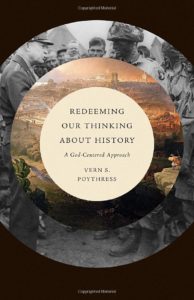
Redeeming Our Thinking about History: A God-Centered Approach
People today are ambivalent toward history. We can’t deny it; but we’re not quite sure how to approach it or what to do with it. Those in the “don’t know much about history” camp are both correct and generally content in making such a claim. Others regard history as little more than an academic subject—necessary, perhaps, and of interest to a certain class, but of little relevance to the rest of us. Then there are those for whom history is always the next best thing. Their embrace of whatever is current in history recalls the intellectuals and thinkers of post-World War II Eastern Europe, who worshiped the flow of history and embraced Marxism. Until it became a tiger-by-the-tail. Further, we see in the “cancel culture” approach to history, and in sweeping attempts to revise history according to sociological interests, a kind of despising of history which intends either to eradicate or redefine it.
This much is certain about history and the study of it: Both fall within the category of “all things” which are of, through, and to our Lord Jesus Christ (Rom. 11:36).
That being so, what if history were more than merely a subject of study to ignore, fuss about, or manipulate for our own ends? What if it was the record of God’s working among peoples and cultures in various times and places? And on that basis, what if history could be a source to help us in our quest to become wise and live at peace? Such a view of history finds persuasive elaboration in Vern S. Poythress’ latest book.
Calvin wrote, “For as an eye, either dimmed by age or weakened by any other cause, sees nothing distinctly without the aid of glasses, so (such is our imbecility) if Scripture does not direct us in our inquiries after God, we immediately turn vain in our imaginations.”1 Poythress offers the lens of Scripture to help us see history as the record of God’s work among people and nations, as He unfolds the divine economy and the eternal Kingdom toward the consummation of history not long hence. His book is one of a series in which Poythress takes seriously the Scripture’s claim to be God’s truth (John 17:17) for understanding philosophy, science, sociology, mathematics, and more purely theological matters.
Poythress’ argument unfolds in five parts: What We Need in Order to Analyze History, History in the Bible, Understanding God’s Purposes in History, What Does History Writing Look Like?, and Alternative Versions of How to Think about History. He announces the focus of his effort early on: “God says that history is important, and it should therefore be important to us” (12). God speaking about and using history throughout Scripture provides the foundation and unifying threads of the book. “History,” Poythress writes “is indispensable in the Bible and in the Christian faith” (16). That conviction energizes Redeeming throughout.
The Introduction explains why history matters and why we should read it. Reading and understanding history as we find it in the Bible expands our view of God, as well as of Christ and His redemption. It also enlarges our view of humanity, in all its fullness and follies. And history has liturgical benefit as well, for if we read history the way the Bible presents it, we will be led to praise and glorify God. The same is true, on all points, when we read history “outside” the Bible through the lens of Scripture.
Part 1 argues that believing in God makes understanding history necessary, since God is the Lord of history, and all His work of redemption takes place within it. Those who write history—whether intimate and personal or grander and more cosmic—make choices about what to include, and those choices are made on the basis of presuppositions about things that matter. For the Christian, what could matter more than knowing, loving, and serving God? History, Poythress argues, is woven with three threads: (1) events, (2) people, and (3) meanings. How we understand these determines how we view history; and this, in turn, reinforces our basic assumptions about history. From the perspective of Scripture, God is inextricably and intimately involved in all three of these threads, and therefore we must not exclude Him from our efforts at understanding extrabiblical history.
Part 2 develops the Biblical foundations for a God-centered approach to history. This will provide the foundation for his assessment of “rival approaches” to a “providentialist” historiography within the Christian camp. Poythress skillfully teaches us how to read the historical writings of Scripture and demonstrates how such writings can guide us in thinking about history beyond the Bible. This section is perhaps the most important as it lays the spiritual, hermeneutical, and intellectual foundation for seeing history as the record of God’s working in time, in which He unfolds His plan of redemption, calls out and gathers His people, and brings glory to himself.
Part 3 explores the subject of God’s purposes in history. Poythress begins this section where he left off in Part 2, asking how the Scriptures direct us in thinking about the question. The Bible, he concludes, is sufficient for even the good work of helping us understand history beyond the Bible. He recognizes that discerning the purposes of God in any historical situation, event, or personage can be difficult, and he offers six circumspect guidelines for approaching this task: (1) “God controls all things and events…”; (2) “God accomplishes all things for his glory…”; (3) “God gives benefits to his saints…” for which we should give thanks; “(4) “God works trials and hardships for the long-term benefit of his beloved and for the praise of his glory”; (5) “God…governs the world” for justice; and (6) history yields moral and spiritual lessons for our edification (141, 142). Each of these principles is grounded in Scripture.
In Parts 1, 4, and 5 Poythress introduces us to various schools of thought about the writing (and teaching) of history. He notes that “history is complicated” (169), and so we are not surprised that Poythress finds things to laud and things to lament in different eras of history-writing, as well as in such non-Christian approaches as rationalism, Marxism, and subjectivism. If we keep the lens of Scripture in place, we can discern elements of the common grace of God in almost all writing of history, discovering and appreciating what coincides with Biblical teaching and critiquing whatever does not. We might expect, Poythress explains, that even reductionist views of history—focusing too narrowly either on events, people, or meanings—might yield insights compatible with a Christian view of history. But such insights must be mined with the tools of a broader Biblical historiography, so that we can gain as much as possible the mind of Christ for any subject. He writes, “It is no good for a Christian to claim that we cannot know what God thinks about the situation. We can know a good deal because God provides doctrinal and moral standards in the Bible. We have to evaluate historical personages and movements using these standards. It is pretense to pretend that we do not know. We sin if we turn away from the answers provided in the Bible” (177). Throughout he provides examples of historical situations, especially those involving issues related to Christianity, as these might be regarded from a non-Christian perspective, but which can be illuminated for spiritual and moral benefit when understood in the light of Scripture.
Poythress’ view of history can be understood as a form of “providentialism,” which he explains in detail in Part 5, and especially chapter 23. This is the Bible’s approach to history, he explains, and so it must be the Christian’s approach as well. He writes, “After all is said, the positive case for providentialism remains valid. The Bible gives us instruction that enables us to make judgments about God’s purposes. Our human judgments are never infallible. But who is claiming that they are? Our judgments may be corrupted by overconfidence or by various programs for social reform. But what study of history may not succumb to such influences?” (201) Which is why we need the sure foundation of Scripture to guide our work in history. Poythress acknowledges the validity of various Christian approaches to historiography; but he believes the providentialist approach incorporates and improves each of these views, allowing Christian historians to work together under a more robust Christian view of divine sovereignty.
Chapter 25 on “Perspectives on Historiography” is especially helpful in applying the principles of a providentialist view of history to evaluating and benefiting from histories written by a variety of historians. This chapter lends sound support to and deeper understanding of a Christian worldview. Throughout Redeeming, Poythress interacts with the tri-perspectivalism made popular by his friend and colleague John Frame. We must consider history from the perspectives of events, people, and meanings to gain as full an understanding as possible. Frame’s view is helpful in guarding against narrow or skewed views of history, so that readers and teachers keep always in mind the events, people, and meanings which yield the benefit we seek from the study of history.
Poythress concludes by calling us to approach the study of history humbly, but with vigor and whole-hearted commitment to God and His purposes. “We do not want merely to stumble around with foggy ideas about history,” he insists (223). And this would be nearly impossible for anyone who reads Redeeming Our Thinking about History carefully and reflectively, and who applies its teaching and guidance to the study of history and its people, events, and meanings.
I highly recommend this book for teachers and students of history, as well as for all who delight in reading history, and those who should.























This review would land more weightily had either the reviewer or the author of the reviewed book actually published scholarly history. Neither of them, to my knowledge, have done so, and some readers, at least, would like to know that they had actually attempted to practice what they have preached.
Indeed, neither author evidences any serious acquaintance with the sophisticated arguments about Christian historiography that have characterized the Conference on Faith and History for two generations and more. I see just under this article, in fact, a reference to a CSR blog review of a book on this very subject, posted April 15, 2017. I commend it to them both—particularly before Professor Poythress accuses any more people who disagree with his take on history-writing as “sinning.”
In response only to this review and not the book (though I trust the reviewer is accurately presenting Poythress’s views), I find a proposal about supposedly writing history from a Christian viewpoint, but only mentioning Christ three times (and always in generalities), and nary a word about Israel.
To my way of thinking, it is always problematic to assert that one can look at human histories/cultures and to divine God’s hand in the particular features of those histories/cultures–particularly when it comes to the Problem of Evil.
I find it incredible that one can assert with eyes wide open these six “circumspect” guidelines set forth by the author: (1) “God controls all things and events…”; (2) “God accomplishes all things for his glory…”; (3) “God gives benefits to his saints…” for which we should give thanks; “(4) “God works trials and hardships for the long-term benefit of his beloved and for the praise of his glory”; (5) “God…governs the world” for justice; and (6) history yields moral and spiritual lessons for our edification (141, 142). What world are we talking about?
Think, for example, of the difficulty of squaring these six “circumspect guidelines” in relation to the Russian invasion of Ukraine, the devastating earthquake in Turkey and Syria, the genocide of the Uyghurs, the needless–and forever–extinction of thousands of species because of environmental degradation at the hands of humans, the Holocaust, the history of slavery, racism, sexism, and the list goes on.
I can only wish that Dietrich Bonhoeffer had survived the the Nazi Third Reich (from what we know of his “Letters and Papers from Prison”). If he had lived, our ability to embrace the extent of human tragedy while uplifting the presence of God among the suffering would have provided a much surer foundation for our faith.